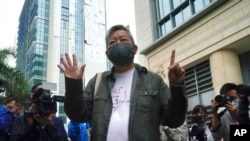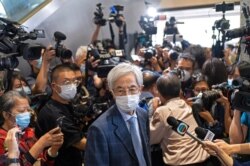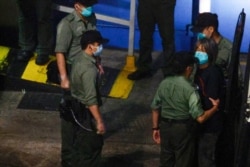Several longtime pro-democracy advocates on Friday learned their fate for organizing one of Hong Kong's largest-ever street protests during the height of anti-government demonstrations.
Nine pro-democracy activists, including media mogul Jimmy Lai, 73, and former lawmakers Lee Cheuk-yan, 64, Leung Kwok-hung, 65, Cyd Ho, 66, and Au Nok-hin, 33, were jailed after being found guilty this month of involvement in an August 2019 march that attracted hundreds of thousands of protesters.
District Judge Amanda Woodcock of Hong Kong's West Kowloon Magistrates Court also suspended sentencing for four other activists because of their age and accomplishments, according to The Associated Press.
Lai, who was additionally charged under the national security law on Friday for the second time and now faces six charges total, received 14 months in jail, as did activist Lee Cheuk-yan, after they had both pleaded guilty of organizing and participating in the rally on August 19, 2019, and of participating in another illegal assembly less than two weeks later.
Not surprised
Former Legislative Council lawmaker Lee Cheuk-yan had expected Friday's outcome. When speaking with VOA in March about Beijing's electoral reforms for Hong Kong, he admitted that he, with four outstanding trials for illegal assembly looming over him, was likely to face jail.
"I think is important not to lose hope and always to do something to 'light a candle in darkness' so people can see the hope and see a lot of people doing different things in the society that show we are holding on to our values," he said. "It is important we hold on.
"If I go to the jail, I think it will be a good time to reflect on my life experience," he told VOA in an audio call.
Ho and Au received eight and 10 months behind bars, respectively, while Leung received the stiffest sentence, 18 months. Au and Leung were already in custody in relation to other cases.
The four remaining activists — "father of democracy" Martin Lee, 82, Margaret Ng, 73, Albert Ho, 69, and Leung Yiu-chung, 67 — received suspended sentences.
Former Democratic Party lawmaker Emily Lau, who was at the court for the sentencing, told VOA that it was a "very, very bad day for Hong Kong."
"So many people who have fought for democracy and human rights and rule of law for so many years have been given such heavy jail sentences for engaging in peaceful and nonviolent protests," she said. "It's very, very sad. But we know everybody, including judges and the government, are under a lot of pressure from Beijing, and they really want to teach Hong Kong people a lesson."
Lau said the length of sentences didn't come as a surprise, as they were notably longer than they had been for activists charged with illegal assembly.
"We know times have changed," said Lau. "Beijing is breathing down on us very heavily, and everybody feels the pressure."
Under the "one country, two systems" agreement signed by Britain and China in 1997 after the city was transferred back to Chinese rule, Beijing promised that Hong Kong would retain a "high degree of autonomy" until 2047.
A controversial extradition bill sparked Hong Kong's monthslong anti-government protests in 2019 that often turned violent. In response, Beijing implemented the national security law for Hong Kong, prohibiting secession, subversion, terrorism and collusion with foreign forces.
Dozens jailed
Since the security legislation came into force, dozens of activists have been jailed while others are awaiting trial or have fled the city. To limit the election of pro-democracy opposition, China's national legislature recently approved a major electoral overhaul for Hong Kong's political system, expanding the number of pro-Beijing voices on Hong Kong's Legislative Council.
Veteran political analyst Joseph Cheng believes the crackdown is meant to "eliminate" the pro-democracy movement.
"These arrests and court cases plus the changes, the so-called 'perfection of the electoral laws,' actually means there is no room for the operation for a pro-democracy movement, meaning there is no tolerance in Hong Kong," he said.
Cheng admitted the scrutiny could spell the end for the veteran activists, but there are now hopes for a younger generation to take the lead.
"You may say the older generation of activists, they probably will no longer be active given their age and given the tremendously difficult situation in the two, three years ahead," Cheng told VOA. "In this way, it is the end of their participation among the first generation like Martin Lee, Lee Cheuk-yan and so on. We certainly pin our hopes on the younger generation."
But for Hong Kong's younger activists, the risks are greater than ever. Yat-Chin Wong, 19, organizer of pro-democracy political group StudentPoliticism, told VOA that "now even just a few words [and you] may be arrested."
"The current red line is erratic, and there is no good way to avoid risks," he said.
Wong, who spent his childhood in China before moving to Hong Kong while in primary school, told VOA in January that national security officers had warned him about his activism in the city, while mainland Chinese authorities had questioned his relatives in Sichuan province.








